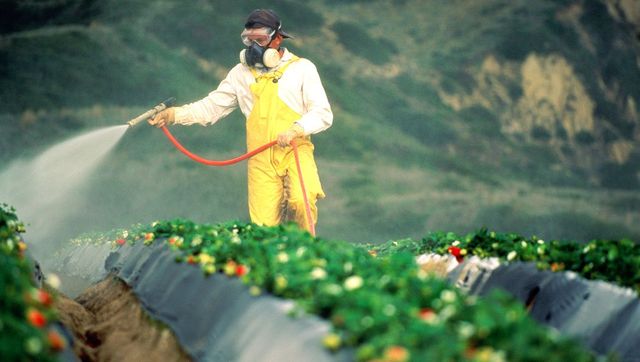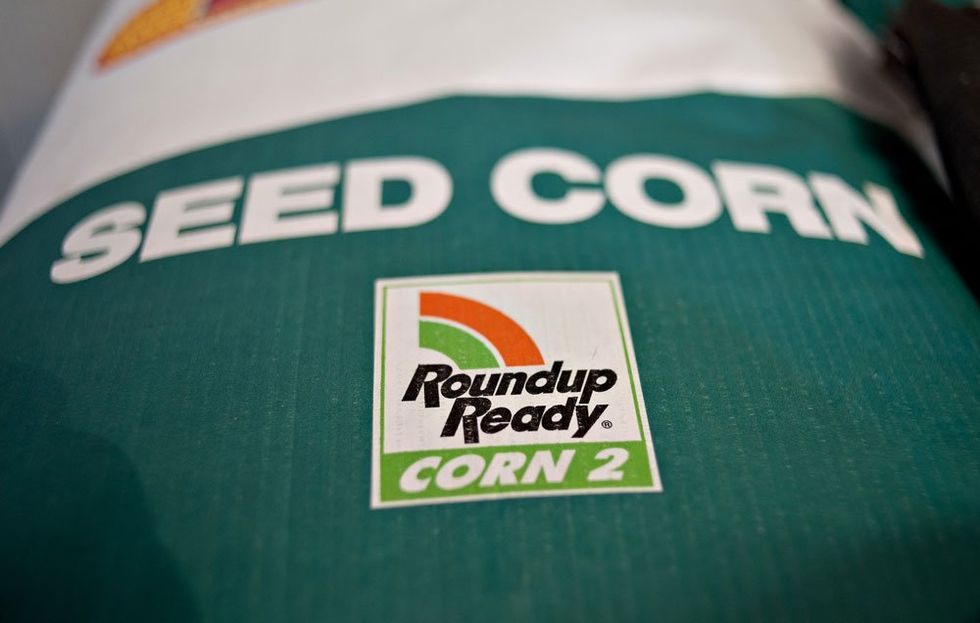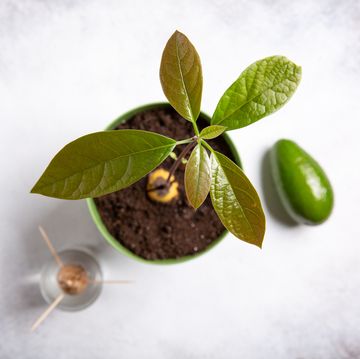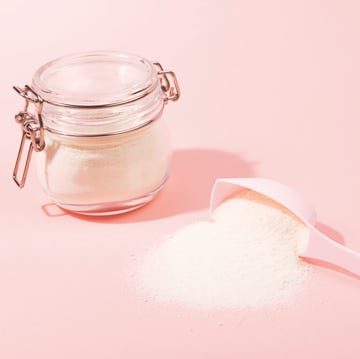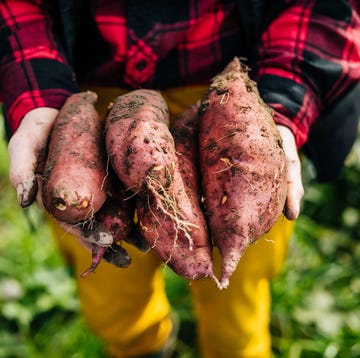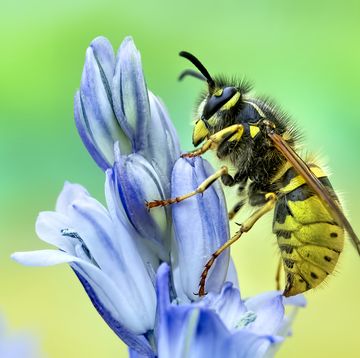This story originally appeared on Rodale’s Organic Life in March 2017.
Do you have a bunch of pesky weeds popping up in your yard or in the cracks on your driveway? Here’s what you should not reach for—Roundup. While the active ingredient in this popular weed killer, glyphosate, has been marketed as safe and even "biodegradable," the science is pouring in, and the results will make you sick.
You're Probably Eating Roundup In "Excessive" Levels
The majority of Roundup dumped onto American land each year isn't in your yards—it's on the food crops. The most popular genetically engineered (GE) crops planted on millions of U.S. acres each year are designed to withstand heavy dousing of glyphosate. Chemical companies are making a killing on this, since they produce both the unnatural GE seed and the chemical that needs to be used on those seeds. But Roundup is a systemic chemical, meaning Roundup is taken up inside of the plants that we—and farm animals—eat. In fact, Norwegian scientists studying U.S. soy found "excessive" levels of glyphosate inside of the food crop. Don't eat tofu? Doesn't matter: GE corn and soy fall under dozens of different ingredient names in most processed foods, such as mono-diglyceride, Soya, lecithin, textured vegetable protein, and more.
Roundup Doubles Your Risk Of Lymphoma
A major new review of 44 scientific studies found that glysphosate exposure doubles farmers' risk of developing non-Hodgkin's lymphoma. The study authors theorize that Roundup disrupts the normal functioning of white blood cells, throwing your immune system into a sickened, dysfunctional state.
Related: 13 Serious Health Conditions Studies Have Linked To Monsanto's Roundup
It's Raining Roundup
Each year, nonorganic farmers dump millions of pounds of Roundup on food crops. The levels are so excessive, that the federal scientists recently detected the weed killer in the air and rain. Veteran pesticide-exposure scientist Warren Porter, PhD, professor of environmental toxicology and zoology at the University of Wisconsin–Madison, crunched the numbers and found the data collected by the United States Geological Survey scientists reveal exposure to Roundup could potentially alter your hormones, leading to obesity, heart problems, and diabetes.
Related: 10 Crazy Things Pesticides Are Doing To Your Body
Roundup Is Annihilating Monarch Butterflies
Researchers at Iowa State University found that the heavy use of glyphosate has resulted in an 81 percent decrease in the monarch butterfly population. Traditionally, milkweed—the plants monarchs need to reproduce and survive as a species (not butterfly bush)—would rebound after farmers used cultivation to kill weeds, but chemical interventions wipe the plant out. Organic agriculture bans the use of chemical pesticides, so every dollar you shift to organic helps save their foodstuff and more monarch butterflies.
Related: Flowers That Promise To Bring Monarch Butterflies To Your Yard
Roundup Flat-Out Kills Human Cells
In 2009, French researchers published a scientific paper in the journal Chemical Research in Toxicology showing that low levels of four glyphosate formulations used in Roundup—levels far below what's allowed in agriculture; levels on par with what's in our food—all kill human umbilical, embryonic, and placental cells within 24 hours.
Related: EPA Bans New Toxic Weed Killer
Roundup Is Killing Your Gut
Glyphosate isn't just an herbicide; it's registered as an antimicrobial agent in the U.S., too, thanks to its ability to wipe out a wide variety of pathogenic organisms. The problem is harmful pathogens like Clostridium botulinum, Salmonella, and E. coli are able to survive in the gut, but the "good guys" in your digestive tract, protective microorganisms, bacillus and lactobacillus, for instance, are killed off. This could set your digestive tract up for a nightmarish situation, including "leaky gut," where the protective gut lining is compromised, allowing bacteria and toxins to escape into your bloodstream. (Check out these other nine weird things killing your gut.)
Roundup Doesn't Work
The kicker? Roundup is not working! Genetically engineering crop seeds to live through herbicide sprayings that would normally kill the crop is a failed technology and a losing battle. Just as overusing antibiotics led to hard-to-kill, antibiotic-resistant supergerms, abusing Roundup has fueled the emergence of nearly impossible-to-kill superweeds.
When GE technology was first introduced, chemical companies touted it as a way to reduce chemical use on food crops. But Professor Chuck Benbrook, PhD, a research professor at Washington State University, recently found that between 1996 and 2011, GMO technology actually increased herbicide use by 527 million pounds—that's an 11 percent bump. And for every pound less of insecticide used, farmers used four pounds more of herbicides.
Because glyphosate-resistant GE crops are failing miserably, the Environmental Protection Agency (EPA)—right now—is considering the approval of an even nastier GE seed designed to survive dousing of glyphosate and the highly toxic, older 2,4-D weed killer. This is called "stacking," and it's expected to dramatically increase the amount of 2,4-D used on our food. In fact, approving crops genetically engineered to survive repeated dousings of 2,4-D will likely quadruple pesticide use, according to Dave Mortensen, PhD, weed scientist at Penn State University. That's bad news, considering 2,4-D has been linked to hypothyroidism, suppressed immune function, Parkinson’s disease, and cancer, among other ills.
Related: 5 Unexpected Places You'll Find Roundup
We Got This!
So how can we get Roundup out of the air, soil, and our bodies? There's only one way: Buy organic food. In doing so, you're sending farmers a clear message.

Leah Zerbe is an online editor for Rodale News, where she covers the food system and environmental health issues. Prior to working at Rodale, she worked for NBCPhiladelphia.com and the Philadelphia Daily News. She and her husband run Potter's Farm, a sustainable farm in Pennsylvania.
